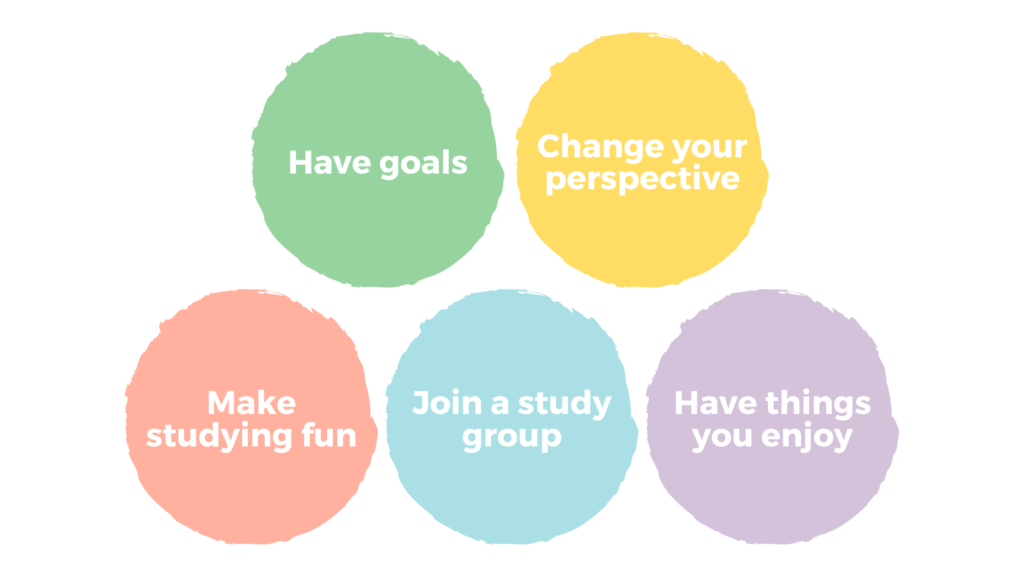So, you’ve reached your QCE years? The big finale. The home stretch. 11 years of schooling lead up to these final two years. For many students, these two years may bring with them a tremendous amount of stress. With this stress, you may find yourself losing motivation or even burnt out by the end of your QCE journey!
Many students will struggle with loss of motivation and/or burnout during the QCE, but there are some things that you can do along the way to help prevent that from being the case!
We’ll take you through how to stay motivated and avoid burnout during this eventful period of your life. Let’s get started!
Maintaining Your Motivation Throughout the QCE
Avoiding Burnout
Maintaining Your Motivation Throughout the QCE
Motivation is incredibly important for doing well in school and during the QCE. Students who have higher levels of motivation will persist longer, produce work of a higher quality, put more effort into their education, and, as a result, learn more deeply. So, it isn’t hard to imagine why staying motivated is important in school.
Here are 5 tips you can follow to maintain your motivation levels throughout the QCE:
Tip #1: Have Goals
One of the fundamental steps towards long-term success in school is goal setting. When we set ourselves goals, we give ourselves something to focus on.
If there is something that we can do to achieve a sense of gratification, then we are more likely to allocate resources such as time and energy to do so. Further, having goals allows us to stay motivated, as there is always something we are working towards and a reason for putting effort in.
When you set goals, this allows you to be more aware of exactly what you are learning! This ensures that you are more engaged during the process of learning.
While goals are great, it is important that they are realistic. If you tell yourself, “I am going to set myself the goal of studying until 9 pm every night, without any breaks,” then you are just going to end up frustrated and will lose motivation.
Tip #2: Change Your Perspective
Sometimes it can be helpful to change your perspective on the importance of the work you need to complete. Maybe you really don’t want to be doing your maths homework right now, but 30 years down the line when you are piloting one of NASA’s spaceships you might look back and think, “Wow, I’m really glad I did my maths homework in high school, it was one of the stepping stones along the path to my success.”
Or maybe, once you’re sitting your external exams you’ll think, “This question is really familiar to the homework problem I had at the beginning of the year! I’m really glad I did it.”
The reality is, we never truly know how important our homework or studying will be down the line — so it’s best to just assume it is really important! If you think something is really important, then you will be more motivated to do it.
Tip #3: Try to Make Study Fun
A go-to study technique for many students is to just read through the textbook a million times or to re-write their notes a million times. Aside from these being very ineffective ways of studying, they can also be super boring and time consuming.
If you know that work is going to be boring, then you will be less motivated to do it. Whereas, if you can find a fun way to study then you are more likely to stick to it.
You might find it easier to start studying and may even find yourself studying for longer. There are a number of ways that you can make studying less mind-numbing:
- Listen to music
- Study somewhere new
- Write comics, short-stories, or songs to help you remember content
- Don’t be passive during your study sessions (use palm cards, or practice questions)
- Listen to educational podcasts while on a walk…
The options are truly endless.
Tip #4: Join a Study Group
It is quite easy to let ourselves down while studying or to break promises that we make with ourselves. But, fortunately for us, we are a lot less likely to let others down or break our promises with another person (especially a friend).
Joining study groups is a great way to use this to our advantage! If you have a few friends in your subjects, ask them to meet up once a week or fortnight.
It’s important to ensure that you have a good number of people — not too many and not too few (4 is generally a good number). If you have too many group members then it becomes too difficult to organise, and if there are too few then it isn’t as beneficial.
Aside from the added motivation to study, study groups are great in that they allow you to divide up the work. When you meet up, you can then share your work with the group.
For example, say you are studying 1984 for English. When it comes time to do character analysis, you can give every group member a different character.
You can assign one person Julia, one person O’Brien, another person Winston, and Syme to someone else.
Everyone will go off and study their character, write up some information, and then share it with the group. This way you get more out of doing less work.
Tip #5: Have Things You Enjoy
To stay motivated, it is really important that you have something fun to do every day. This means that you are more likely to stay engaged throughout the day.
Personally, I really like to start off my day with something fun (especially on the days where my uni classes start a little later).
For example, I might watch a movie in the morning and at 9-10 am I start studying or working. I find that when I spend some time in the morning doing something fun, then I am more engaged during the day, less distracted, and I end up getting more work done.
However, with school schedules, doing something fun in the morning usually isn’t possible (unless you wake up super early — but sleep is worth it, I promise!). So, you may want to spend some time just relaxing when you get home from school — the homework can wait just a little longer.
Avoiding Burnout
Avoiding burnout is also really important for doing well in school — probably even more important than staying motivated. If you have experienced burnout, then you would know that it can be incredibly hard to recover from.
Thus, taking the steps throughout the year to prevent it, is key. Here are three key things you can implement to avoid burnout:
Tip #1: Rethink Study Timetables
Most students will make at least one study timetable during their time at school. However, very few of these students stick to their study timetable.
The issue is that most students focus their timetable around studying. Now, I know this sounds super counter-intuitive, but focussing your study timetable around study is one of the worst things you could do.
The reason for this is that you forget to make time for the other important things in your life. You may also begin to miss out on the things you enjoy doing because of your study timetable.
For example, if your family has a tradition of watching movies together on a Friday night, then you shouldn’t schedule study on a Friday night.
It is important that you schedule in the things you enjoy first, then schedule in work if you have a job, and then schedule in study. You should fit your study around the rest of your life — it shouldn’t be, or dictate, your life.
It is also important that your timetables are flexible! For example, suppose you have Minecraft scheduled for 12-2 pm on a Saturday.
If your mum comes to tell you, “Hey, this Saturday we’re going to have lunch with your grandparents because it’s Grandma’s birthday,” you can’t turn around and say, “Uh, pass. I have Minecraft to play!”
When we schedule our lives around the times we are going to study, these timetables become really difficult to maintain. Further, we may overwork ourselves, leading to burnout.
Tip #2: Reconsider the Quantity of Work
It can be really easy to overwhelm ourselves with school work. So it is important to take a step back and reconsider how much work you should be doing, and what work is overkill.
It is really easy to do too much — especially when it comes to writing notes. You should get in the habit of writing your notes only once.
Re-writing notes is unnecessary, time consuming, and is extra work you don’t need to do.
Write your study notes well the first time!! Learn how to take effective study notes for Humanities and Social Sciences!
It isn’t just about what work you are doing, but also when you start working. You should start studying earlier in the year, to lighten the load.
This means doing things like writing your notes and making flash cards as you go. You should be doing lots of small study sessions consistently throughout the year, rather than a few very big ones in the weeks leading up to the exam.
One way you can adjust the quantity of work is to drop down to five QCE subjects! Read more about your options in our article!
Tip #3: Take Care of Yourself
Lastly, but most importantly, you should be taking care of yourself throughout the year. This means:
- Being active (i.e., going out for walks, playing a sport, etc.)
- Getting 8-10 hours of sleep per night
- Eating a good balanced diet
- Drinking plenty of water
- Taking plenty of breaks throughout the day
Curious how your results differ in Year 11 and Year 12 for the QCE? Find out here!
On the hunt for other QCE resources?
Check out some of our other articles related to the QCE below:
Check out all of our QCE Term 3 articles in one place!
- The Ultimate Guide to Term 1 – All Essential Resources to Help you Ace your Assessments
- Everything You Need to Know About the QCE and ATAR
- What Are QCE Points and How Many Do You Need?
- QCE Year 11: How to Effectively Prepare for Your IA Exam Block
- The Ultimate List of QCAA Cognitive Verbs That You Need To Know
- What You Should Consider When Selecting Your QCE Subjects
- QLD Subject Scaling: Which Subjects Scale the Best from QCAA?
- Why the Start of Year 11 is so Hard
Are you looking for some extra help with maintaining motivation levels throughout the QCE?
We have an incredible team of QCE tutors and mentors!
We can help you master your QCE subjects and ace your upcoming QCE assessments with personalised lessons conducted one-on-one in your home or online!
Looking specifically for English tutoring? Check out our English tutoring in Brisbane!
We’ve supported over 8,000 students over the last 11 years, and on average our students score mark improvements of over 20%!
Stay accountable to a tutor this year, with one of our many expert QCE tutors located in Brisbane. On the Gold Coast or in the Townsville area? We can help too!
To find out more and get started with an inspirational QCE tutor and mentor, get in touch today or give us a ring on 1300 267 888!
Katelyn Smith was a pioneer in the Queensland ATAR system. After graduating in 2020 with an ATAR of 98.40, she now studies a Bachelor of Advanced Science (Honours) at The University of Queensland — majoring in Physics. Through her studies, she hopes to develop a greater appreciation for how the wonders of the universe work. When she isn’t slaving away behind her unnecessarily large textbooks, she enjoys catching up with friends, scrolling mindlessly through TikTok, and sleeping.






